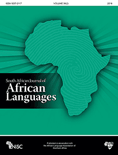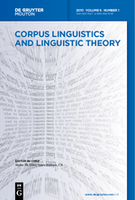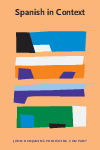
FRANCAIS MODERNE
Scope & Guideline
Fostering Academic Excellence in French Language and Literature
Introduction
Aims and Scopes
- Linguistic Policy and Planning:
The journal explores the impact of linguistic policies on the French language and its variants, particularly in regions like Flanders and the Indian Ocean islands, emphasizing the role of language in governance and cultural identity. - Sociolinguistics and Inclusive Language:
A consistent focus on how sociocultural factors influence language use, including discussions on inclusive language practices and the feminization of language in Francophone societies. - Historical and Diachronic Linguistics:
The journal investigates the evolution of the French language through diachronic studies, including historical grammar and the development of linguistic structures over time. - Grammatical Studies and Terminology:
It delves into the methodologies of grammar teaching, terminological choices in linguistics, and the development of grammatical terminologies, reflecting on both traditional and contemporary approaches. - Digital Textualities and New Media:
The journal addresses the intersection of language and technology, focusing on how digital contexts reshape textual practices and the implications for linguistic studies.
Trending and Emerging
- Inclusive Linguistics:
The rise of discussions around inclusive language practices showcases a growing awareness and response to sociocultural changes, emphasizing the importance of language in promoting equality and representation. - Language and Identity:
An increasing number of papers explore the relationship between language and identity, particularly in multilingual contexts, highlighting how language shapes and reflects cultural identities. - Digital Linguistics:
There is a significant trend towards studying the impact of digital media on language, including how digital textualities influence writing practices, language evolution, and communication styles. - Policy and Language Rights:
Emerging discussions on language rights and policies reflect a critical engagement with how language is regulated and promoted in various sociopolitical contexts, particularly within Francophone regions. - Interdisciplinary Approaches to Linguistics:
A trend towards interdisciplinary research, integrating insights from fields such as sociology, history, and digital humanities, indicates a broadening of the journal's analytical frameworks.
Declining or Waning
- Traditional Linguistic Structures:
There seems to be a declining emphasis on purely traditional analyses of linguistic structures without sociocultural context, as newer studies increasingly incorporate social dimensions into their analyses. - Cross-Linguistic Comparisons:
The journal has shown a reduced focus on comparative linguistics between French and other languages, which was once a more prominent theme, possibly due to a shift towards more localized studies. - Historical Linguistic Phenomena:
Although historical studies remain relevant, the frequency of papers dedicated solely to historical linguistics has decreased, indicating a shift towards contemporary applications of linguistics. - Narrowly Defined Grammatical Topics:
Research that focuses narrowly on specific grammatical rules or constructs without broader implications for language use or policy appears to be declining, as the journal favors more integrative approaches. - Static Language Analysis:
The analysis of language as a static entity has become less prevalent, with a growing interest in dynamic and contextualized approaches to understanding language use.
Similar Journals

Lengua y Habla
Bridging Cultures Through Rigorous Linguistic ResearchLengua y Habla is a distinguished academic journal published by UNIV LOS ANDES in Venezuela, recognized for its contribution to the field of linguistics and language studies. With an ISSN of 2244-811X and a commitment to scholarly excellence, this journal has established itself as an important resource for researchers and practitioners alike since its inception in 2013. As of 2023, it is categorized in the Q3 quartile of linguistics and language, reflecting its significant presence in the broader academic community. The journal's Scopus rankings highlight its relevance, placing it in the 52nd percentile in Arts and Humanities and the 48th percentile in Social Sciences. Although it operates under a non-open access model, it provides valuable insights and innovative research aimed at advancing the understanding of language dynamics. With an address situated in the picturesque region of Merida, Venezuela, Lengua y Habla demonstrates a dedicated mission to promote rigorous academic discourse and foster engagement among students, researchers, and language professionals across the globe.

Revista Virtual de Estudos da Linguagem-ReVEL
Bridging Disciplines to Illuminate Language InsightsRevista Virtual de Estudos da Linguagem-ReVEL is a prominent academic journal dedicated to the field of linguistics, published by REVISTA VIRTUAL ESTUDOS LINGUAGEM in Brazil. With its ISSN 1678-8931, ReVEL aims to provide a platform for scholarly communication and dissemination of research across diverse areas of language studies, including sociolinguistics, language acquisition, and discourse analysis. As an open-access journal, it fosters accessibility to important linguistic research, allowing researchers, educators, and students alike to engage with the latest findings without subscription barriers. The journal’s focus on innovative methodologies and interdisciplinary approaches makes it a valuable resource for those seeking to deepen their understanding of language dynamics in various contexts. By contributing to the growing body of knowledge in this field, ReVEL plays a crucial role in promoting scholarly dialogue and enhancing the visibility of Brazilian linguistic research on a global scale.

Verba-Anuario Galego de Filoloxia
Fostering Innovative Research in Language and PhilologyVerba-Anuario Galego de Filoloxia is a prominent academic journal published by UNIV SANTIAGO COMPOSTELA, dedicated to advancing the field of linguistics and language studies. Hailing from Spain, this journal provides a vital platform for researchers, educators, and students interested in Galician philology and its broader linguistic implications. Although it operates under traditional access models, the journal’s commitment to quality research is reflected in its categorization within Q3 in Linguistics and Language for 2023, showcasing its significant contributions to the field. Encompassing a convergence period from 2017 to 2024, Verba garners attention in both the Arts and Humanities and Social Sciences domains, with its Scopus rankings highlighting its moderate impact within these categories. By nurturing scholarly dialogue and disseminating innovative studies, Verba-Anuario Galego de Filoloxia plays a crucial role in promoting linguistic research, making it an essential resource for professionals and academic institutions striving to explore the complexities of language and philology.

Lingue Antiche e Moderne
Pioneering Research at the Intersection of Time and TongueLingue Antiche e Moderne is an esteemed open-access academic journal dedicated to the study of ancient and modern languages, published by UNIV STUDI UDINE. Since its inception in 2012, the journal has provided a platform for researchers, professionals, and students to disseminate groundbreaking studies and interdisciplinary research in linguistics and philology. With a commitment to accessibility, Lingue Antiche e Moderne encourages the sharing of knowledge across a global audience, ensuring that innovative ideas and historical insights are readily available to all. The journal plays a crucial role in advancing our understanding of linguistic evolution and cultural interchange, making it a vital resource for anyone interested in the dynamics of language through time. The ISSN for the journal is 2281-4841, ensuring its recognition in the academic community. Researchers and contributors are invited to engage with this vibrant discourse while enriching their own scholarly endeavors.

South African Journal of African Languages
Celebrating the cultural tapestry of African languages.The South African Journal of African Languages, published by Routledge Journals, Taylor & Francis Ltd, is a premier academic resource dedicated to the advancement of research in the fields of linguistics, language, and literary theory. Since its inception in 1996, this journal has been pivotal in fostering scholarly discourse around African languages, contributing significantly to our understanding of cultural and linguistic diversity across the continent. With its impressive categorization in 2023 as Q2 in Linguistics and Language and Q1 in Literature and Literary Theory, the journal attracts high-quality research and innovative perspectives, positioning itself among the leading publications in the relevant academic arenas. Researchers and students alike will find valuable insights within its pages, as it consistently ranks in the top percentiles of Scopus, notably achieving an 81st percentile in Literature and Literary Theory. The journal is committed to enhancing accessibility to research, although it currently does not offer Open Access options. Its scope includes an array of topics related to language policy, linguistic preservation, and literary critique, making it an essential resource for those engaged in the rich tapestry of African linguistics and literature.

Italian Journal of Linguistics
Illuminating the nuances of language and communication.Italian Journal of Linguistics is a prominent academic journal published by PACINI EDITORE, dedicated to advancing the understanding of linguistic theory and application. With its inception in 1996, the journal has fostered scholarly discourse and continues to contribute to the field through rigorous peer-reviewed articles. Operating under the prestigious field of linguistics, the journal currently holds a respectable Q3 quartile ranking as of 2023, showcasing its relevance in the academic community. It also ranks in the top 30% of journals in both Arts and Humanities and Social Sciences disciplines, reflecting its impactful contributions documented in Scopus rankings. While the Italian Journal of Linguistics is not an open-access journal, it offers invaluable insights and innovative research findings, making it an essential resource for researchers, professionals, and students keen on exploring the nuances of language and linguistics. Based in Pisa, Italy, the journal serves as a significant platform for both contemporary studies and classic investigations in linguistics, appealing to an international audience devoted to this ever-evolving field.

Cuadernos de Linguistica Hispanica
Innovating Research in Hispanic Linguistic StudiesCuadernos de Linguistica Hispanica is a distinguished open access journal published by UNIV PEDAGOGICA & TECNOLOGICA COLOMBIA, dedicated to advancing research in the field of linguistics and language studies since its inception. With an ISSN of 0121-053X and E-ISSN 2346-1829, this journal has established itself as an important platform for scholars to share innovative findings and insights within the linguistics community. As a Q3-ranked journal in linguistics and language according to 2023 category quartiles, it occupies a significant position in Scopus rankings, showcasing its commitment to quality and relevance. With the aim to foster scholarly discourse and promote understanding of the Hispanic linguistic landscape, the journal welcomes contributions that explore a diverse range of topics and methodologies. The journal has embraced open access since 2008, ensuring that research is accessible to a broader audience, thus enhancing its impact and engagement within both academic and professional spheres.

NEUPHILOLOGISCHE MITTEILUNGEN
Navigating the Intricacies of Philology and Linguistic StudiesNEUPHILOLOGISCHE MITTEILUNGEN, published by the esteemed Modern Language Society, stands as a significant contribution to the domain of Language and Linguistics. With a history dating back to 1971, this journal has consistently provided an academic platform for researchers and scholars, navigating through the intricacies of philology and linguistic studies. Although it is indexed in Scopus with rankings reflecting its position in the Arts and Humanities and Social Sciences categories, it currently does not offer Open Access, which may require interested parties to seek institutional access for its wealth of content. The journal has experienced periods of coverage discontinuation in recent years, yet it remains a valued source for advancing the understanding of language theories and linguistic practices. Its location in Helsinki, Finland, offers a unique European perspective on global linguistic issues. The journal is ideal for those looking to engage with evolving linguistic trends and contribute to contemporary discussions in the field.

Corpus Linguistics and Linguistic Theory
Unveiling language patterns through innovative corpus analysis.Corpus Linguistics and Linguistic Theory, published by DE GRUYTER MOUTON, is a premier academic journal dedicated to advancing the interdisciplinary field of linguistics through the lens of corpus-based research methodologies. With an ISSN of 1613-7027 and E-ISSN 1613-7035, this journal is a valuable resource for linguists, researchers, and students who aim to investigate language structures, usage, and their theoretical implications. Recognized as a Q1 journal in the realm of Linguistics and Language, it boasts impressive Scopus rankings, positioning it within the top 7% and 8% of its categories in the Arts and Humanities and Social Sciences, respectively. Its relevance is underscored by a commitment to publishing rigorous research from 2005 to 2024, addressing contemporary advancements in linguistic theory fueled by empirical data. While the journal is not open access, it remains an essential platform for disseminating high-quality scholarship that informs both theoretical perspectives and practical applications in linguistics. As such, Corpus Linguistics and Linguistic Theory plays a crucial role in shaping the future of linguistic studies, making it indispensable for anyone engaged in this dynamic field.

Spanish in Context
Exploring the Rich Tapestry of Spanish Language and LiteratureSpanish in Context, published by John Benjamins Publishing Co, is a leading journal in the field of linguistics and literature, focusing on the contexts and uses of the Spanish language. With an ISSN of 1571-0718 and an E-ISSN of 1571-0726, this reputable journal has established itself as an essential resource for researchers, professionals, and students alike since its inception in 2004. The journal enjoys a strong presence in academic discourse, holding a prestigious Q2 category ranking in Linguistics and Language, and an esteemed Q1 ranking in Literature and Literary Theory for the year 2023. Furthermore, its contributions to the field are underscored by impressive Scopus rankings: it occupies the 40th position in the Arts and Humanities category for Literature and Literary Theory, representing the top 96th percentile. With an ongoing commitment to advancing scholarship and understanding of Spanish in various contexts until 2024, the journal welcomes original research articles, reviews, and critical essays that delve into linguistic innovations and literary trends. By fostering a dynamic dialogue among academics and practitioners, Spanish in Context plays a vital role in enhancing the visibility and relevance of Spanish studies on a global scale.